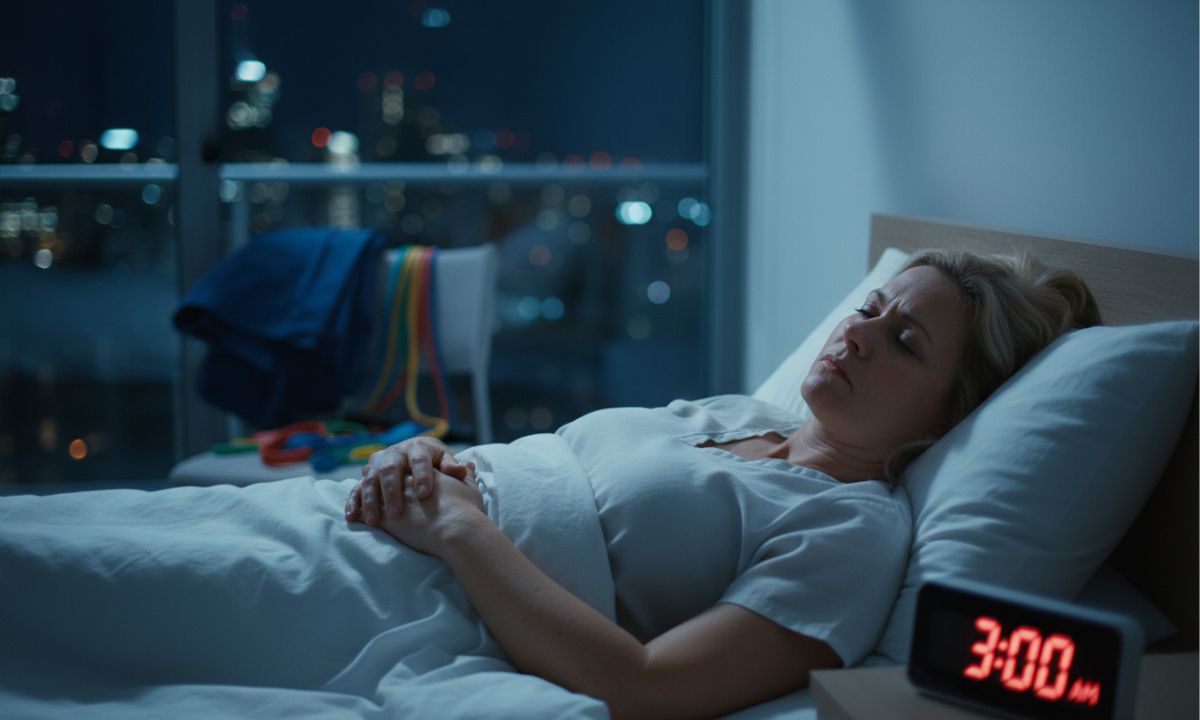Sleep Science for Recovery: How Optimising Rest Transforms Rehabilitation Outcomes

Sarah, a Brisbane nurse recovering from a workplace back injury, lies awake at 3 AM for the fourth night this week. Her pain medications help during the day, but a good night’s sleep has become difficult. Her physiotherapy progress has stalled, leaving her frustrated and wondering if she'll ever return to work. What Sarah doesn't realise is that her sleep struggles could be delaying her recovery.
The Hidden Science Behind Sleep and Recovery
During sleep, your brain clears toxins, your immune system strengthens and damaged tissues repair themselves. Recent research from the University of Queensland has improved our understanding of this process, revealing that poor sleep actually drives pain development and can prevent recovery.
Dr David Klyne's research shows that recovery from acute pain depends significantly on sleep quality. When sleep is disrupted, the nervous and immune systems become primed to enhance pain sensitivity, potentially creating a cycle where poor sleep leads to increased pain, which further disrupts sleep. This discovery has profound implications for anyone undergoing rehabilitation.
Queensland's Revolutionary Approach to Sleep-Focused Rehabilitation
A physiotherapy-first program now integrates sleep assessment directly into chronic pain treatment, positioning physiotherapists at the forefront of innovative rehabilitation approaches.
This program emerged from the following research findings:
- Many chronic pain patients suffer from undiagnosed sleep disorders such as insomnia and obstructive sleep apnoea
- When these conditions were addressed alongside traditional physiotherapy, patients experienced significant pain reduction and improved functional outcomes
- The approach is so promising that it could substantially reduce reliance on medications and invasive procedures.
Understanding Sleep Challenges in Common Injuries
Different injuries create different sleep challenges that may need a more targeted approach to recovery:
Whiplash injuries: lead to both sleep disruption and increased pain sensitivity, with neck pain and stiffness making it difficult to find a comfortable sleeping position.
Back injuries: hard to find a position that doesn’t exacerbate pain, while muscle spasms can jolt patients awake.
Shoulder injuries: people naturally sleep on their sides, which can affect sleeping positions. It can be challenging when combined with pain that worsens when lying down and long recovery periods.
Research shows that pain and discomfort from injuries can lower pain tolerance and worsen fatigue, creating a poor sleep cycle that’s hard to manage. Mental health disturbances, such as anxiety, are also common after injury and add another factor to sleep challenges.
Practical Sleep Strategies for Recovery
The environment plays a crucial role in sleep quality, particularly when managing injury-related pain and discomfort.
Sleep Environment Optimisation
Keeping your bedroom between 15-19°C allows deeper sleep stages. Blackout curtains or eye masks eliminate light pollution that can disrupt your body's natural melatonin production.
Noise reduction is equally important, and even sounds that don't fully wake you can fragment sleep stages. Consider using earplugs or a white noise machine, particularly if your injury requires sleeping in different positions that might make you more sensitive to sounds.
Timing and Consistency Strategies
Consistent sleep and wake times reinforce your body's circadian rhythm, even when injury disrupts your normal routine. Try to keep the difference between weekday and weekend sleep schedules under one hour.
If pain medications affect your sleep timing, work with your healthcare provider to optimise timing. Some medications can cause drowsiness or alertness at inconvenient times, and adjusting the timing of doses can improve sleep quality.
Position and Comfort Modifications
For back injuries, sleeping on your back with a pillow under your knees can maintain natural spine curvature. Side sleepers should place a pillow between their knees to prevent hip rotation that might stress the lower back.

Shoulder injury recovery often requires sleeping on the uninjured side with proper pillow support. A pillow hugged against the chest can prevent the injured arm from falling forward, while a pillow behind the back prevents rolling onto the injured shoulder.
Pre-Sleep Routines for Recovery
A pre-sleep routine signals your body that it's time to begin the healing process. This routine should begin 30-60 minutes before your intended sleep time and include calming activities.
Gentle stretching or prescribed exercises can help reduce muscle tension and prepare your body for rest. Avoid vigorous exercise within three hours of bedtime, as this can increase alertness and body temperature.
Technology Tools for Sleep Optimisation
Modern sleep tracking technology offers insights into how well you're actually sleeping during recovery. Wearable devices like fitness trackers and smartwatches can provide valuable data.
Consumer Sleep Trackers
Fitness trackers provide basic but useful sleep metrics. While not as precise as medical-grade equipment, these devices can help identify patterns and trends in your sleep quality throughout recovery.
The Oura Ring offers a more detailed sleep analysis. It tracks body temperature, heart rate variability and movement patterns to provide insights into sleep quality and recovery readiness.
Advanced Sleep Technology
EEG-based sleep wearables offer a more detailed analysis of sleep architecture, particularly useful for complex cases involving neurological impacts or post-surgical recovery. These devices can even deliver interventions such as auditory stimulation to enhance deep sleep.
WHOOP straps focus on recovery metrics, providing daily recovery scores based on heart rate variability, resting heart rate and sleep performance. This technology helps users understand when their body is ready for more intensive rehabilitation activities versus when rest and recovery should be prioritised.
Sleep Apps and Digital Tools
Sleep diary apps help patients log sleep habits and identify patterns contributing to poor rest. These digital tools can track factors like pain levels and environmental conditions to help identify what hinders sleep quality.
Guided relaxation apps offer meditation and mindfulness exercises designed to promote sleep. These can be good for managing the anxiety and stress that accompany injuries and disrupt sleep.
Also read: 5 Free Apps to Help with Anxiety and Post-Traumatic Stress (PTSD)
When Sleep Problems Persist
Despite best efforts with sleep hygiene and environmental modifications, some patients experience persistent sleep problems that require professional intervention.
Warning Signs
If you're taking more than 30 minutes to fall asleep, waking multiple times per night or feeling unrefreshed despite adequate time in bed, these may indicate underlying sleep disorders.
Changes in sleep patterns that persist beyond the acute injury phase may indicate developing chronic sleep issues. If sleep problems worsen as your injury heals, this suggests other factors may be contributing to sleep disruption.
Professional Sleep Services in Queensland
Queensland Health has a Sleep Disorders Program that provides specialist assistance and treatment for patients with sleep apnoea and related conditions.
The program's equipment loan scheme addresses financial barriers to accessing continuous positive airway pressure therapy, providing devices to patients who demonstrate clinical need and meet eligibility criteria.
Supporting Your Recovery Team
Your healthcare providers need accurate information about your sleep patterns to optimise your rehabilitation program. Keeping a sleep diary provides valuable insights for planning treatment.
Communicating with Your Physiotherapist
Share sleep tracking data with your physiotherapist, as this information can help them adjust treatment intensity and timing to align with your body's recovery patterns. If you're sleeping poorly, your physiotherapist might modify exercise intensity or timing to avoid overstressing your system.
Discuss how different treatments affect your sleep. Some manual therapy techniques or exercise programs might initially disrupt sleep patterns before improving them, and understanding these can help maintain realistic expectations.
Working with Your Medical Team
If you're taking pain medications, discuss with your doctor how these might be affecting your sleep. Some medications can cause drowsiness during the day and still affect your sleep at night. Timing adjustments or alternative medications might improve both pain management and sleep quality.
Mental health support becomes crucial when sleep problems persist, as the relationship between sleep, pain and psychological well-being may require professional guidance to navigate successfully.
Also read: Adjusting to Life After an Injury
Sleep as Recovery Medicine
Rather than treating sleep as a luxury or secondary concern, we're beginning to understand it as fundamental medicine, making it as essential as any prescription or therapy session.
For patients currently in the rehabilitation process, this research offers hope and practical direction. Your sleep quality is about optimising your body's natural healing mechanisms and potentially accelerating your return to full function.
The future of rehabilitation recognises that optimal recovery requires addressing the whole person, not just the injured body part. Sleep sits at the centre of this holistic approach, influencing tissue healing, pain perception and mental resilience.
As Queensland continues to lead in sleep-focused rehabilitation approaches, patients have access to sophisticated tools and strategies for their recovery. The combination of evidence-based sleep interventions, advancing technology and comprehensive healthcare support creates unprecedented opportunities for achieving the best rehabilitation outcomes.
By prioritising sleep as seriously as any other aspect of your rehabilitation program, you're giving your body the best possible conditions for healing and your future self the gift of complete recovery.
If it's time to talk, we're here to help. Get free advice direct from our solicitors today.





